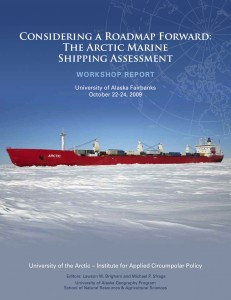Report details next steps in arctic shipping policies
September 15, 2010

907-474-7902
9/15/10
As the climate warms and global commerce grows, the prospect of an arctic shipping route becomes more tangible. A new report released by the University of Alaska Fairbanks offers international policymakers guidance for navigating the political and practical ramifications of shipping in the Arctic.
The report, “Considering a Roadmap Forward: The Arctic Marine Shipping Assessment,” is the result of a workshop hosted by UAF in October 2009 as part of the University of the Arctic’s Institute for Applied Circumpolar Policy. The workshop drew nearly 70 experts from Canada, China, Denmark, Japan, Norway, the United Kingdom and the United States to examine the 17 recommendations outlined in the Arctic Council’s 2009 Arctic Marine Shipping Assessment.
“The workshop report takes the key AMSA recommendations and provides to the arctic community a list of action items to consider as we collectively navigate a future of change,” said Mike Sfraga, head of the UA Geography Program and UAF vice chancellor for students.
Sfraga co-chairs the Institute for Applied Circumpolar Policy with Kenneth Yalowitz of Dartmouth College. Yalowitz is director of the Dickey Center for International Understanding at Dartmouth.
“The future of shipping in the Arctic is one of the most important issues resulting from climate change in the North,” Yalowitz said.
The three-day October 2009 workshop focused on three themes: enhancing arctic marine safety, protecting arctic people and the environment, and building the arctic marine infrastructure. The 24-page report offers dozens of proposed actions, many of which will require public or private funding. Among the highest-priority policy issues are:
• A mandatory International Maritime Organization Polar Code.
• Full tracking and monitoring of arctic commercial ships.
• An arctic search and rescue agreement (underway).
• Surveys of indigenous marine use.
• A circumpolar response capacity agreement among the arctic states.
• Implementation of an arctic observing network to support science and marine operations.
“The working groups identified a roadmap, actions and a set of key issues for each of AMSA’s recommendations,” said UAF geography professor Lawson Brigham, who led the original AMSA effort for the Arctic Council.
Sfraga presented the report at an Institute for Applied Circumpolar Policy workshop in Rovaniemi, Finland, last week. UAF Chancellor Brian Rogers is sharing the report with members of the University of the Arctic, Arctic Council and Arctic Parliamentarians in Brussels this week. It is available online at http://www.snap.uaf.edu/downloads/arctic-marine-shipping-assessment. The workshop report will also be widely distributed to the global maritime and arctic communities.
ADDITIONAL CONTACTS: Mike Sfraga at 907-474-7317 or msfraga@alaska.edu. Lawson Brigham, UAF geography professor, at 907-474-7494 or lwb48@aol.com.
ON THE WEB:
The Arctic Marine Shipping Assessment, http://pame.is/amsa
University of the Arctic’s Institute for Applied Circumpolar Policy, http://iacp.dartmouth.edu/
MG/9-15-10/043-11


